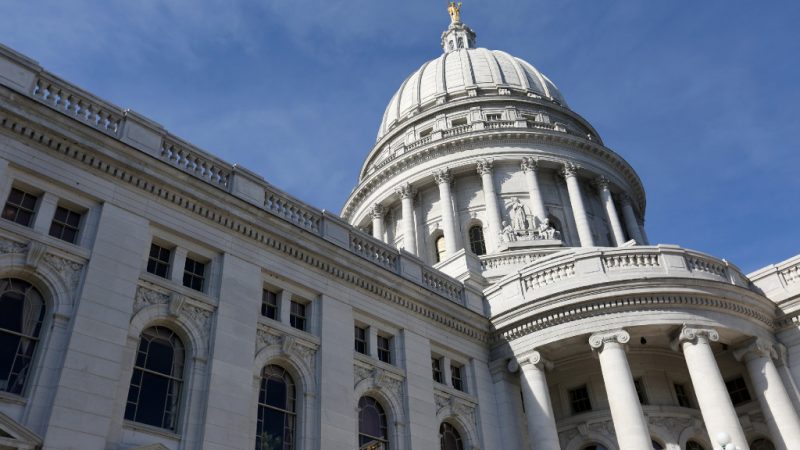A legislative committee voted unanimously to deny the Milwaukee County DA a future raise over how John Chisholm’s office handled the case of a man who was released on $1,000 bail and later arrested after his SUV plowed through the Waukesha Christmas parade.
Joint Committee on Employment Relations Co-chair Chris Kapenga, R-Delafield, said he couldn’t support a raise for Chisholm over his office’s handling of Darrell Brooks’ case.
“We do not feel that someone who is failing at his job and has made decisions that have led to the death of more than a handful of people in my district, there’s no way we’re going to approve something like that,” Kapenga said.
Brooks was released 11 days before six people were killed and dozens more injured in the parade. Chisholm has acknowledged the $1,000 bail for charges that included domestic violence and disorderly conduct should’ve been substantially more but has defended his office’s actions and rebuffed calls for him to step down.
>> WisPolitics is now on the State Affairs network. Get custom keyword notifications, bill tracking and all WisPolitics content. Get the app or access via desktop.
The committee’s action yesterday comes as Republican lawmakers have called on Gov. Tony Evers to remove Chisholm from his post.
The provision targeting Chisholm was part of an overall 2021-23 state compensation plan that the committee approved unanimously yesterday. That plan included future raises for every other DA in the state.
The pay for elected officials can’t be increased or lowered during their term, so the move will have no immediate impact on Chisholm, who was reelected in 2020. Still, the committee’s action keeps Chisholm’s salary at $145,288 for the next two years.
That means future bumps for the Milwaukee County DA, including any that would be included in the 2023-25 budget, would be based on a lower starting point.
Chisholm didn’t immediately return a message left at his office.
Outgoing Assembly Minority Leader Gordon Hintz, D-Oshkosh, originally voted against the motion. But he received unanimous consent to switch his vote in favor of the plan. He told WisPolitics.com afterward he doesn’t like things that are “reactionary,” but he ultimately decided to support other provisions in the pay plan.
That includes raises of 2 percent in January and another 2 percent in January 2023 for most state employees, as well as workers at the UW System.
The JCOER motion also included an additional pay increase for prison guards and sergeants at maximum security prisons in addition to what was approved during the state budget process.
But the boost wasn’t as generous as what Evers had sought in a trailer bill his administration proposed this fall.
Evers proposed the additional pay boost as the state has continued to struggle with vacant prison guard and sergeant positions, forcing Corrections to use forced overtime to fill shifts. The overall vacancy rate at adult institutions is 24.3 percent with Waupun at 47.9 percent and Columbia at 46.3 percent. Both are maximum security prisons. The vacancy rate is 39 percent at youth facilities.
That $92.3 million trailer bill Evers proposed included $81.4 million for a $5-an-hour boost to each step of the pay progression for prison guards and sergeants on top of what they were already slated to receive. It also included $8.3 million for a $2-an-hour add-on for personnel at maximum security prisons and another $2.5 million to increase the pay of nurses.
The motion included the extra $2 an hour for those at maximum security prisons, but provided no funds for the Department of Corrections to cover the costs. Instead, the agency will be expected to pay for the raise through existing funds. The committee motion also included pay increases for some nurses that had been expected to cost $424,300. That raise also will have to be covered by existing funds.
Assembly Speaker Robin Vos, who co-chairs the committee, argued Evers is free to pay for the other raises he requested for prison guards by using federal COVID-19 funds at his disposal.
GOP lawmakers and Evers have repeatedly clashed over the funds, which the guv has sole discretion over disbursing, and Republican legislators have passed a string of bills trying to direct how the money is spent.
Vos said he opposed using general purpose revenue for the raises because it would increase the overall price tag by requiring the state to pump more money into education. That’s because the federal government is requiring states to maintain the share of their funds that go to education in order to qualify for COVID-19 aid designated for K-12 schools.
“To me as a business owner, I would never spend dollars that are less effective than those that are more effective,” Vos said.
Hintz argued it made no sense to use one-time money for an ongoing cost. He accused his Republican colleagues of paying lip service to the needs of prison guards by saying they would support the additional raises, but only if they were paid with federal funds.
“If they matter, we pay for it, and we pay for it in a way that doesn’t undermine our ability to pay for it in the future,” Hintz said.
See the overall motion here.


